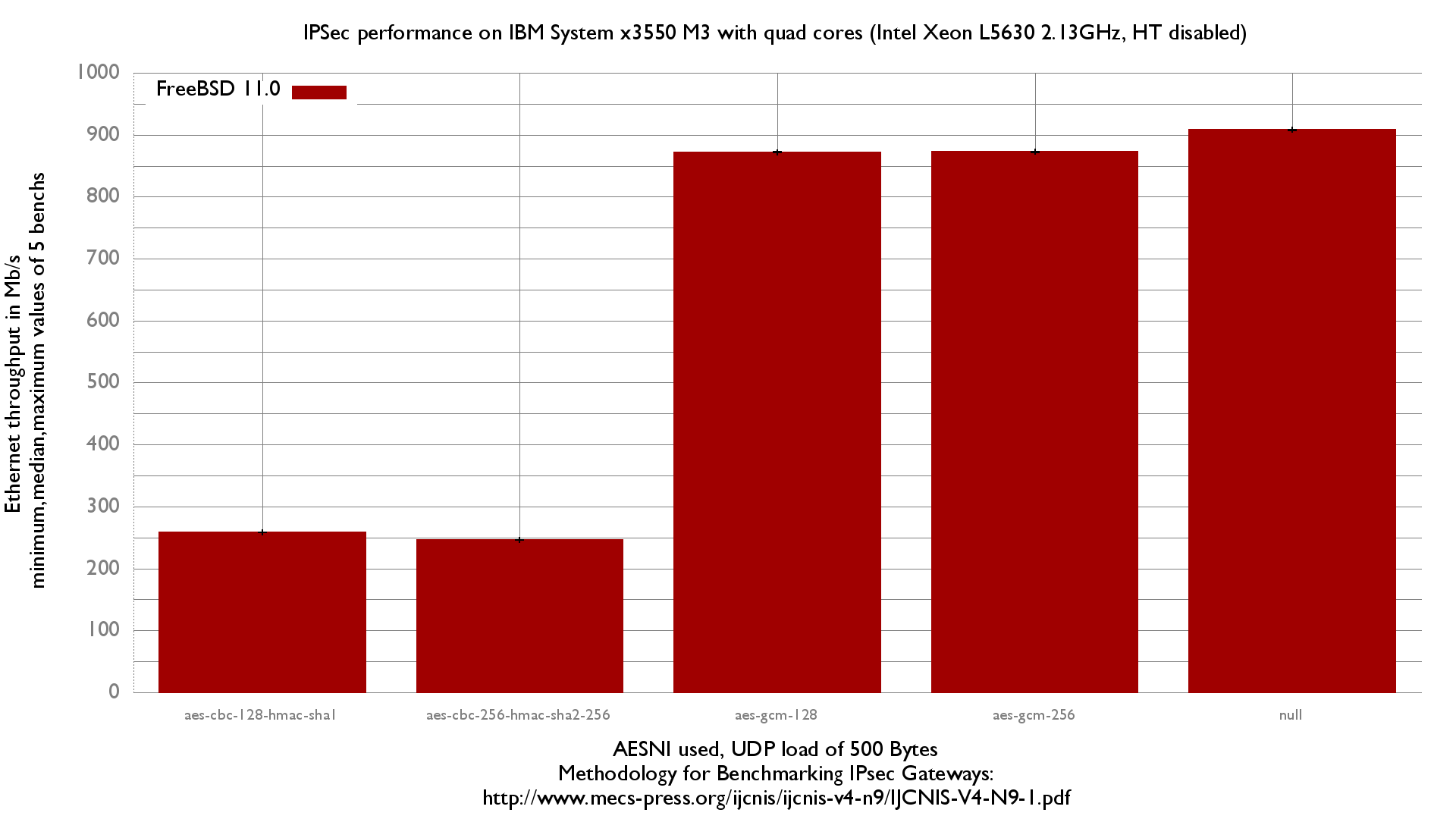- en
- fr
Table of Contents
IPSec performance lab of an IBM System x3550 M3 with Intel 82580
IPSec performance lab of a quad cores Xeon 2.13GHz and quad-port gigabit Intel 82580
Hardware detail
This lab will test an IBM System x3550 M3 with quad cores (Intel Xeon L5630 2.13GHz, hyper-threading disabled) and a quad NIC 82580 connected to the PCI-Express Bus.
This CPU includes AES-NI: AES-CBC,AES-XTS,AES-GCM,AES-ICM.
Method used
The benchmarking method used here is detailed in Setting up a VPN (IPSec, GRE, etc...) performance benchmark lab.
Diagram
+---------------------+ +-------------------------------------+ +----------------------------------------+
| R1 | | IBM x3550 M3 | | R3 |
| Packet generator | | Device under Test | | IPSec endpoint |
| and receiver | | | | (AES-NI) |
| | | | | |
|igb2: 198.18.0.201/24|=>=| igb2: 198.18.0.202/24 | | |
| 2001:2::201/64| | 2001:2::202/64 | | |
| 00:1b:21:d4:3f:2a| | 00:1b:21:d3:8f:3e | | |
| | | | | |
| | | igb3: 198.18.1.202/24 |==>=| igb2: 198.18.1.203/24 |
| | | 2001:2:0:1::202/64 | | 2001:2:0:1::203/64 |
| | | 00:1b:21:d3:8f:3f | | 00:1b:21:c4:95:7a |
| | | | | |
| | | static routes | | static routes |
| | | 198.19.0.0/16 => 198.18.1.203 | | 198.19.0.0/16 => 198.19.0.201 |
| | | 198.18.0.0/16 => 198.18.0.201 | | 198.18.0.0/16 => 198.18.1.202 |
| | | 2001:2::/49 => 2001:2::201 | | 2001:2::/49 => 2001:2:0:1::202 |
| | |2001:2:0:8000::/49 => 2001:2:0:1::203| | 2001:2:0:8000::/49=>2001:2:0:8000::201 |
| | | | | |
|igb3: 198.19.0.201/24| | | | igb3: 198.19.0.203/24 |
|2001:2:0:8000::201/64| | | | 2001:2:0:8000::203/64 |
| 00:1b:21:d4:3f:2b | | | | 00:1b:21:c4:95:7b |
+---------------------+ +-------------------------------------+ +----------------------------------------+
|| ||
==================================<============================================
Devices configuration
Almost the same as on the forwarding performance lab but with fastforwarding disabled (not compatible with IPsec).
R2 (DUT)
Disable fastforwarding (not compliant with IPSec), configure IP address, routes and static IPSec.
/etc/rc.conf:
# IPv4 router gateway_enable="YES" ifconfig_igb2="198.18.0.202/24 -tso4 -tso6 -lro" ifconfig_igb3="198.18.1.202/24 -tso4 -tso6 -lro" static_routes="generator receiver" route_generator="-net 198.18.0.0/16 198.18.0.201" route_receiver="-net 198.19.0.0/16 198.18.1.203" static_arp_pairs="receiver generator" static_arp_generator="198.18.0.201 00:1b:21:d4:3f:2a" static_arp_receiver="198.18.1.203 00:1b:21:c4:95:7a" # IPv6 router ipv6_gateway_enable="YES" ipv6_activate_all_interfaces="YES" ifconfig_igb2_ipv6="inet6 2001:2::202 prefixlen 64" ifconfig_igb3_ipv6="inet6 2001:2:0:1::202 prefixlen 64" ipv6_static_routes="generator receiver" ipv6_route_generator="2001:2:: -prefixlen 49 2001:2::201" ipv6_route_receiver="2001:2:0:8000:: -prefixlen 49 2001:2:0:1::203" static_ndp_pairs="receiver generator" static_ndp_generator="2001:2::201 00:1b:21:d4:3f:2a" static_ndp_receiver="2001:2:0:1::203 00:1b:21:c4:95:7a" # Enabling IPSec ipsec_enable="YES" # Enabling AES-NI kld_list="aesni"
/etc/ipsec.conf
flush; spdflush; spdadd 198.18.0.0/16 198.19.0.0/16 any -P out ipsec esp/tunnel/198.18.1.202-198.18.1.203/require; spdadd 198.19.0.0/16 198.18.0.0/16 any -P in ipsec esp/tunnel/198.18.1.203-198.18.1.202/require; add 198.18.1.203 198.18.1.202 esp 0x1000 -E aes-gcm-16 "12345678901234567890"; add 198.18.1.202 198.18.1.203 esp 0x1001 -E aes-gcm-16 "12345678901234567890"; spdadd 2001:2::/49 2001:2:0:8000::/49 any -P out ipsec esp/tunnel/2001:2:0:1::202-2001:2:0:1::203/require; spdadd 2001:2:0:8000::/49 2001:2::/49 any -P in ipsec esp/tunnel/2001:2:0:1::203-2001:2:0:1::202/require; add 2001:2:0:1::203 2001:2:0:1::202 esp 0x1002 -E aes-gcm-16 "12345678901234567890"; add 2001:2:0:1::202 2001:2:0:1::203 esp 0x1003 -E aes-gcm-16 "12345678901234567890";
R3 (reference)
Disable fastforwarding (not compliant with IPSec), configure IP address, routes and static IPSec:
# IPv4 router gateway_enable="YES" ifconfig_igb2="inet 198.18.1.203/24" ifconfig_igb3="inet 198.19.0.203/24" static_routes="generator receiver" route_generator="-net 198.18.0.0/16 198.18.1.202" route_receiver="-net 198.19.0.0/16 198.19.0.201" static_arp_pairs="receiver generator" static_arp_generator="198.18.1.202 00:1b:21:d3:8f:3f" static_arp_receiver="198.19.0.201 00:1b:21:d4:3f:2b" # IPv6 router ipv6_gateway_enable="YES" ipv6_activate_all_interfaces="YES" ifconfig_igb2_ipv6="inet6 2001:2:0:1::203 prefixlen 64" ifconfig_igb3_ipv6="inet6 2001:2:0:8000::203 prefixlen 64" ipv6_static_routes="generator receiver" ipv6_route_generator="2001:2:: -prefixlen 49 2001:2:0:1::202" ipv6_route_receiver="2001:2:0:8000:: -prefixlen 49 2001:2:0:8000::201" static_ndp_pairs="receiver generator" static_ndp_generator="2001:2:0:1::202 00:1b:21:d3:8f:3f" static_ndp_receiver="2001:2:0:8000::201 00:1b:21:d4:3f:2b" # Enabling IPSec kld_list="aesni" ipsec_enable="YES"
/etc/ipsec.conf:
flush; spdflush; spdadd 198.18.0.0/16 198.19.0.0/16 any -P in ipsec esp/tunnel/198.18.1.202-198.18.1.203/require; spdadd 198.19.0.0/16 198.18.0.0/16 any -P out ipsec esp/tunnel/198.18.1.203-198.18.1.202/require; add 198.18.1.203 198.18.1.202 esp 0x1000 -E aes-gcm-16 "12345678901234567890"; add 198.18.1.202 198.18.1.203 esp 0x1001 -E aes-gcm-16 "12345678901234567890"; spdadd 2001:2::/49 2001:2:0:8000::/49 any -P in ipsec esp/tunnel/2001:2:0:1::202-2001:2:0:1::203/require; spdadd 2001:2:0:8000::/49 2001:2::/49 any -P out ipsec esp/tunnel/2001:2:0:1::203-2001:2:0:1::202/require; add 2001:2:0:1::203 2001:2:0:1::202 esp 0x1002 -E aes-gcm-16 "12345678901234567890"; add 2001:2:0:1::202 2001:2:0:1::203 esp 0x1003 -E aes-gcm-16 "12345678901234567890";
IPSec benchmark "Equilibrium throughput" method
Once done, we start using a fast method for measuring the “IPsec equilibrium throughput” of the DUT.
From the packet generator/receiver a simple script that use netmap-pktgen will do the job:
[root@pkt-gen]~# equilibrium -u -4 -d 00:1b:21:d3:8f:3e -t igb2 -r igb3 Benchmark tool using equilibrium throughput method - Benchmark mode: Bandwitdh (bps) for VPN gateway - UDP load = 500B, IPv4 packet size=528B, Ethernet frame size=542B - Link rate = 1000 Mb/s - Tolerance = 0.01 Iteration 1 - Offering load = 500 Mb/s - Step = 250 Mb/s - Measured forwarding rate = 500 Mb/s Iteration 2 - Offering load = 750 Mb/s - Step = 250 Mb/s - Trend = increasing - Measured forwarding rate = 750 Mb/s Iteration 3 - Offering load = 1000 Mb/s - Step = 250 Mb/s - Trend = increasing - Warning: Generated only 959Mb/s in place of 1000Mb/s - Measured forwarding rate = 872 Mb/s Iteration 4 - Offering load = 875 Mb/s - Step = 125 Mb/s - Trend = decreasing - Measured forwarding rate = 872 Mb/s Iteration 5 - Offering load = 937 Mb/s - Step = 62 Mb/s - Trend = increasing - Measured forwarding rate = 872 Mb/s Iteration 6 - Offering load = 906 Mb/s - Step = 31 Mb/s - Trend = decreasing - Measured forwarding rate = 872 Mb/s Iteration 7 - Offering load = 891 Mb/s - Step = 15 Mb/s - Trend = decreasing - Measured forwarding rate = 872 Mb/s Estimated Equilibrium Ethernet throughput= 872 Mb/s (maximum value seen: 872 Mb/s)
⇒ IPSec overhead prevent to reach 1Gb/s of clear traffic across an encrypted 1Gb/s link (974Mb/s seems to be the maximum in our case), but we reach about 872 Mb/s!

